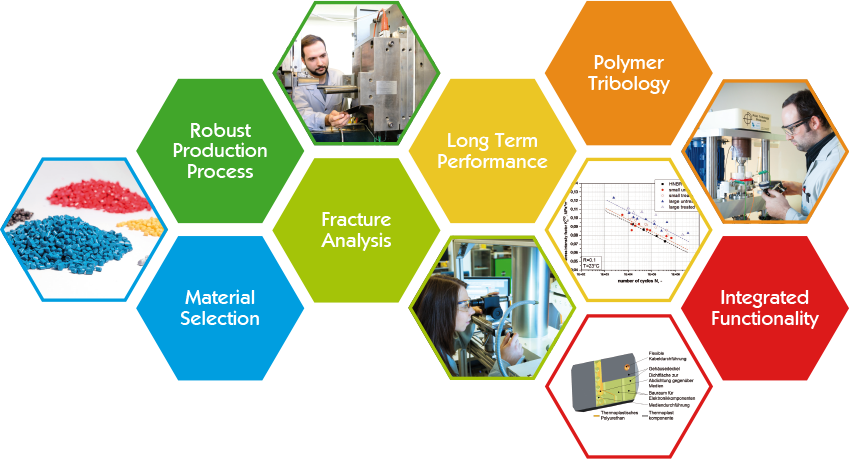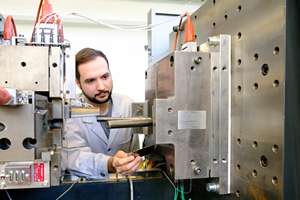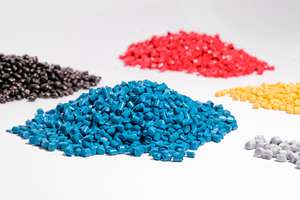“One Stop Solution”

Competences and technical applications
Elastomer components are being used extensively in industrial applications, sometimes under extreme conditions. Given the complex chemical formulation of elastomers, only a complete view of the whole process chain (from the processing of the components to the specific characterization of different material properties) leads to an understanding of product performance.
 With more than 10 years of expertise in the field of elastomers and thermoplastics, our experts provide assistance with material selection processes and the development of novel materials as well as compounds for different environments. In addition to adequate material, a robust manufacturing process (e.g., injection molding) is indispensable to guarantee consistent material quality for ambitious applications. Therefore, our expertise covers well-proven processing strategies, both for elastomers and thermoplastic materials, and advanced technologies such as foaming and additive manufacturing. Finally, fracture analysis and the deduction of structure-property relationships are important elements in gaining knowledge about components and materials in application. In the wide field of characterization techniques, the PCCL offers established material testing (e.g. tensile, DMA, tear resistance), evaluation of long-term performance (e.g. creep, relaxation) as well as cyclic loading and dynamic tests up to 20m/s. Furthermore, tribological challenges can be solved using modular test set-ups, ranging from linear to rotational experiments including enhanced analysis of friction and wear behavior.
With more than 10 years of expertise in the field of elastomers and thermoplastics, our experts provide assistance with material selection processes and the development of novel materials as well as compounds for different environments. In addition to adequate material, a robust manufacturing process (e.g., injection molding) is indispensable to guarantee consistent material quality for ambitious applications. Therefore, our expertise covers well-proven processing strategies, both for elastomers and thermoplastic materials, and advanced technologies such as foaming and additive manufacturing. Finally, fracture analysis and the deduction of structure-property relationships are important elements in gaining knowledge about components and materials in application. In the wide field of characterization techniques, the PCCL offers established material testing (e.g. tensile, DMA, tear resistance), evaluation of long-term performance (e.g. creep, relaxation) as well as cyclic loading and dynamic tests up to 20m/s. Furthermore, tribological challenges can be solved using modular test set-ups, ranging from linear to rotational experiments including enhanced analysis of friction and wear behavior.
With its comprehensive knowledge of materials, processing, as well as the performance of materials and components under operating conditions, the PCCL assists with implementing new concepts and design adaptions and with realizing innovative products, along with opening up new markets.
Scientific approach
To successfully implement high-performance polymer components, it is crucial to understand the material properties, the processing steps as well as product performance.
 In the context of the processing of elastomers, viscosity data of rubber compounds are obtained under process-oriented shear conditions by employing a special IMM (injection molding machine) mounted- rheological mold. These data are then used to improve the results of injection molding simulations, as laboratory conditions for flow data measurements often differ significantly from manufacturing conditions. To gain a deeper understanding of the complex flow behavior during the dosing phase, we have designed a test stand which also affords the possibility to link pressure build-up and energy input to the material. Process parameters (e.g. dosing torque, total work of injection, temperatures) are used to identify the state of the rubber compound during manufacturing and to predict the properties of the finished part. Adjusting the process inline to maximize quality generates a self-optimizing rubber injection molding machine.
In the context of the processing of elastomers, viscosity data of rubber compounds are obtained under process-oriented shear conditions by employing a special IMM (injection molding machine) mounted- rheological mold. These data are then used to improve the results of injection molding simulations, as laboratory conditions for flow data measurements often differ significantly from manufacturing conditions. To gain a deeper understanding of the complex flow behavior during the dosing phase, we have designed a test stand which also affords the possibility to link pressure build-up and energy input to the material. Process parameters (e.g. dosing torque, total work of injection, temperatures) are used to identify the state of the rubber compound during manufacturing and to predict the properties of the finished part. Adjusting the process inline to maximize quality generates a self-optimizing rubber injection molding machine.
The curing performance in terms of optimizing the heating time and measuring the resulting crosslink density (e.g., compression set, dynamic characterization) is taken into account as well. Furthermore, the crosslink density is determined by swelling experiments and the Flory-Rehner equation as well as by solid state double quantum NMR spectroscopy. This is crucial as the crosslink density significantly impacts the performance of elastomers.
The effects of thermo-oxidative ageing are also investigated, with respect to both physical-chemical and mechanical properties. As an example, for HNBR at elevated temperatures (up to 170°C) two distinct effects are observed: (1) degradation of the polymer chain and (2) increase of the crosslink density. These effects were studied in detail, using swelling experiments, tension tests, dynamic mechanical characterization as well as high rate fracture tests up to 5m/s on single edge notched tension specimens. Using a high speed camera (up to 675.000 fps) the crack growth behavior is recorded, and the surface strain around the growing crack is calculated using digital image correlation systems.
The performance of polymers, e.g., in sealing applications, depends on the friction and wear characteristics (adhesive/abrasive wear and fatigue wear). For the characterization of these effects, a customized ring on disc specimen is loaded on a rotational Tribometer TE 93 in different lubrication states (dry contact, initial lubrication and full lubrication). With the combination of these results and the material behavior (uniaxial, biaxial and pure shear), simulation models are established to simulate the contact pressure and the deformation of different sealing lip geometries. Moreover, material fracture is investigated by scanning electron microscopy and light microscopy, together with the measurement of specimen/counterpart roughness.
The scientific recognition enjoyed by the division is reflected by numerous peer-reviewed publications in high-ranking peer-reviewed journals and conference proceedings in the last years as well as presentations at leading scientific and technological conferences worldwide. Worth mentioning are the World Tribology Congress, the ECOTRIB, the PolyTrib, the Polymer Processing Society Conference, the Fall Rubber Colloquium, the German Rubber and the German Tribology Conference, the International Rubber Conference, the RubberCon, the European Conference of Fracture, the Foams conference as well as the International Mechanical Engineering Congress & Exposition.
The Elastomer technologies and process optimization division covers all aspects of the value chain. The establishment of structure-property relationships is based on a fundamental knowledge of materials, processing techniques as well as the characteristics of components.
Research groups
The Elastomer Technologies and Process Optimization division consists of three research groups:
Polymer Tribology (headed by DI Dr. Andreas Hausberger)
Material Science and Testing (headed by DI Dr. Andreas Hausberger / DI Dr. Roman Kerschbaumer)
Processing Technologies (headed by DI Dr. Roman Kerschbaumer)

















